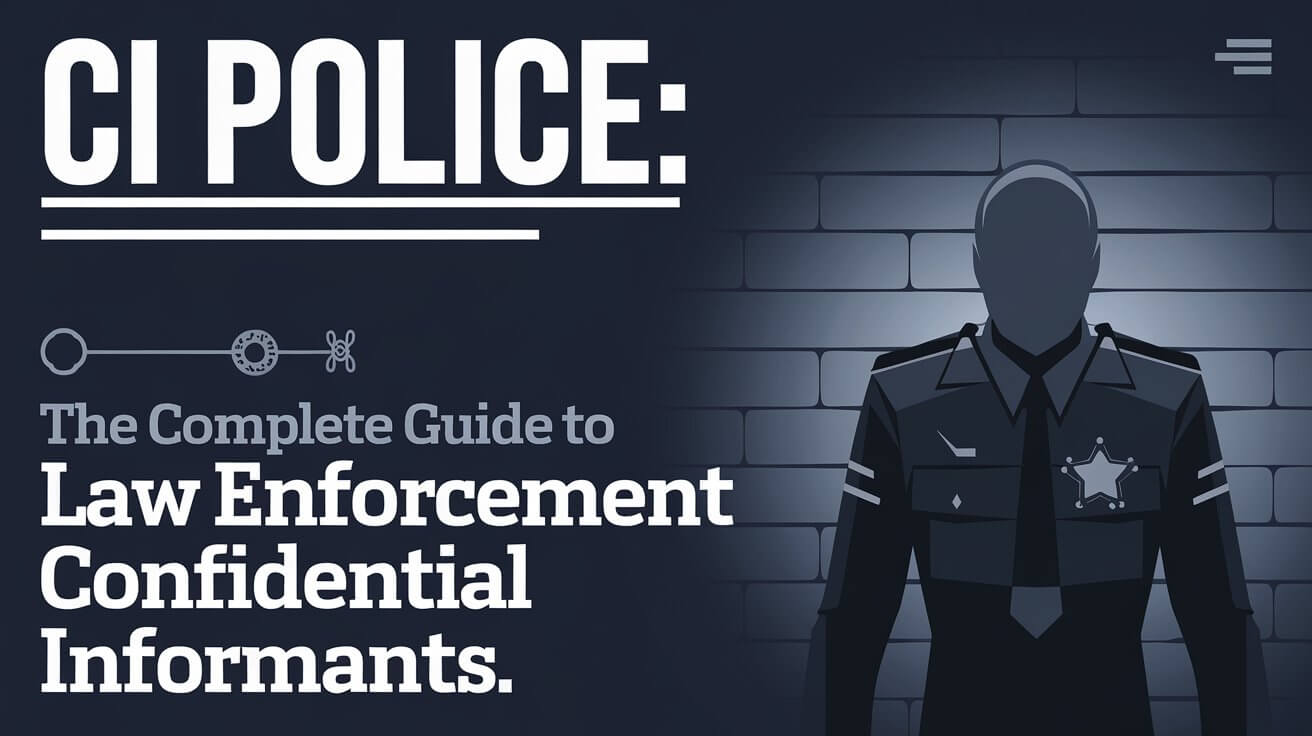CI Police: The Complete Guide to Law Enforcement Confidential Informants

A CI police program forms the backbone of many successful criminal investigations across America. Police departments rely on confidential informants as crucial tools to crack tough cases and infiltrate criminal networks. These secret sources work directly with law enforcement to provide insider information about criminal activities.
The Role of CI Police Programs
Law enforcement runs two main types of investigations – reactive and proactive. Reactive cases start after a crime happens. Proactive cases involve police actively seeking out criminal activity. Both types need reliable inside information from the criminal world.
Types of Police Confidential Informants
The CI police system includes three distinct categories of informants:
- The Accused CI These informants face current criminal charges. Police offer deals to reduce or dismiss charges in exchange for cooperation. Many accused CIs also receive payment based on successful cases or drug seizure amounts.
- The Convicted CI Jailhouse informants already serve time in prison. They provide information about cellmate confessions or crimes committed by their associates. Their motivation centers on reducing their current sentence or pending charges.
- The Career CI Career informants often have minor past records that give them street credibility. They maintain connections in criminal circles while working regularly with law enforcement. Payment comes through percentage agreements on seized assets, drugs, or cash.
Operations and Procedures
Police handlers follow strict protocols when working with confidential informants. The CI receives a unique identification number instead of using their name. This protects their identity in official reports and documentation.
Standard CI police operations include:
- Controlled drug buys with marked money
- Surveillance of criminal meetings
- Recording of conversations using hidden devices
- Detailed searches before and after operations
- Documentation of all CI activities
Police use sophisticated recording equipment during CI operations. Modern devices hide easily in everyday items like:
- Eyeglasses
- Keychains
- Shirt buttons
- Small cameras
The CI Police Handler Relationship
The relationship between police handlers and CIs requires careful management. Handlers must:
- Maintain regular contact
- Monitor CI activities
- Verify information accuracy
- Ensure legal compliance
- Protect CI safety
- Document all interactions
Police handlers cannot make direct promises about case outcomes. Only prosecutors have authority to drop or reduce charges. This creates tension in the handler-CI relationship since police lack full control over rewards.
CI Police System in Criminal Investigations
The confidential informant system helps solve major crimes through insider access. CIs penetrate criminal networks in ways uniform officers cannot. Their connections and street knowledge open doors for investigations.
Drug Crime Operations
Drug investigations heavily rely on CI police programs. Informants set up controlled buys that lead to dealer arrests. The process typically follows these steps:
- CI contacts the target dealer
- Police search the CI and provide marked money
- CI completes the drug purchase while under surveillance
- Police document the transaction
- Officers arrest the dealer based on evidence
- CI may face mock arrest to protect their cover
Organized Crime Cases
CIs help police tackle organized crime through:
- Intelligence about criminal operations
- Names of key players
- Locations of illegal activities
- Timing of criminal acts
- Asset and money movement details
Their insider position lets them gather critical details while maintaining criminal trust. This access produces evidence for major cases against crime organizations.
Rights and Legal Protections
The CI police system includes legal safeguards for both informants and investigations. Courts established clear rules about CI use and rights.
Confidentiality Rules
Police must protect CI identities to ensure their safety. The law recognizes this need through:
- Sealed court records
- Restricted access to CI files
- Limited disclosure requirements
- Penalties for revealing CI identities
- Protected witness status options
However, complete confidentiality has limits. Courts may require CI identity disclosure in certain cases.
Court Testimony Requirements
CIs must testify truthfully if called to court. Common myths claim CIs never testify, but this proves false. Trial testimony obligations include:
- Confirming their role as an informant
- Describing their agreements with police
- Explaining their actions in the case
- Revealing any benefits received
- Answering defense questions honestly
Identity Disclosure Conditions
Courts decide when to reveal CI identities based on specific factors:
- CI involvement level in the crime
- Importance to the defense case
- Safety risk assessment
- Availability of other evidence
- Impact on future investigations
Simple “tipsters” usually stay anonymous. But CIs directly involved in criminal acts may face disclosure.
Compensation and Agreements
The CI police system includes various reward options. Payment methods depend on the type of CI and case details.
Payment Structures
Police departments compensate CIs through:
- Direct cash payments
- Percentage of seized assets
- Per-case completion bonuses
- Regular stipends
- Reward program funds
Federal agencies often offer higher payment rates than local police. Some CIs earn substantial amounts through asset seizure percentages.
Charge Reduction Deals
Many CIs work to reduce their own criminal charges. These arrangements typically require:
- Complete honesty with police
- Successful case assistance
- Meeting operation quotas
- Court testimony if needed
- Following all handler instructions
Prosecutors make final decisions about charge reductions. Police cannot guarantee specific case outcomes to CIs.
Safety and Risk Management
CI police work carries serious dangers. Both handlers and informants face safety challenges requiring careful management.
Protection Measures
Police take steps to protect CIs through:
- Secret identity systems
- Careful meeting locations
- Communication security
- Cover story development
- Emergency protocols
However, no protection system guarantees complete safety. CIs accept significant personal risk.
Operational Security
Handlers maintain strict security through:
- Limited knowledge sharing
- Secure communication methods
- Careful surveillance planning
- Evidence protection
- Identity concealment
One security breach can endanger the CI and compromise investigations. Police must balance operational needs with safety concerns.
Risk Assessment Protocols
Police evaluate risks for each CI operation by checking:
- Criminal history of targets
- Location dangers
- Surveillance options
- Backup response plans
- Emergency exit routes
High-risk operations require extra safety measures and command approval.
Common Challenges and Solutions
The CI police system faces ongoing difficulties requiring careful management.
Reliability Issues
Police must verify CI information because:
- Some CIs provide false leads
- Others exaggerate details
- Many seek extra payments
- Some protect criminal friends
- Few admit their mistakes
Handlers verify claims through surveillance and other sources before acting.
Legal Complications
CI cases face special legal challenges like:
- Identity disclosure battles
- Evidence admissibility questions
- Constitutional rights issues
- Witness credibility attacks
- Prosecution strategy limits
Defense attorneys often challenge CI evidence and testimony validity.
Operational Risks
Daily CI operations face problems including:
- Cover compromise dangers
- Criminal violence threats
- Evidence contamination
- Surveillance detection
- Communication breaches
Police adjust tactics based on past problems and emerging threats.
The Future of CI Police Programs
Modern technology changes CI police operations. New tools and methods reshape traditional approaches.
Technology Integration
Police now use advanced tools like:
- Digital recording devices
- GPS tracking systems
- Electronic surveillance
- Secure communications
- Data analysis software
But technology also helps criminals detect CI activities. The arms race continues between police and criminals.
Modern Challenges
Today’s CI police programs face new issues:
- Social media exposure risks
- Digital evidence complexity
- Encryption barriers
- Surveillance detection technology
- International crime connections
Departments must adapt while protecting traditional CI capabilities.
The CI police system remains vital for law enforcement success. Careful management, proper training, and ongoing adaptation help agencies handle current challenges while preparing for future needs. Both handlers and informants play crucial roles in this complex but necessary part of modern policing.
Training and Development
Police departments invest heavily in CI handler training. Proper management skills prove crucial for successful informant programs.
Handler Selection Process
Not every officer qualifies as a CI handler. Departments choose handlers based on:
- Previous investigation experience
- Communication abilities
- Judgment skills
- Emotional stability
- Professional reputation
Selected officers undergo specialized training before managing CIs.
Core Training Components
CI police handler training covers:
- Legal requirements
- Safety protocols
- Communication methods
- Documentation systems
- Risk assessment
- Informant psychology
- Evidence handling
Handlers learn through classroom sessions and practical exercises. Regular updates keep skills current.
Documentation Standards
Proper paperwork protects both police and informants. Every interaction requires careful recording.
Required Records
CI police files must include:
- Initial registration forms
- Payment receipts
- Meeting notes
- Operation reports
- Evidence logs
- Performance evaluations
- Safety assessments
Missing documentation can damage court cases and create liability issues.
Information Security
Police protect CI files through:
- Restricted access systems
- Secure storage areas
- Code number usage
- Redacted copies
- Digital encryption
Only authorized personnel can view complete CI records.
Ethics and Accountability
The informant system demands strict ethical standards. Both handlers and departments face regular oversight.
Ethical Guidelines
CI police programs follow rules about:
- Truthful communication
- Payment fairness
- Safety priorities
- Rights protection
- Evidence integrity
Violations can end careers and damage cases.
Oversight Systems
Multiple layers check CI operations:
- Supervisor reviews
- Internal affairs audits
- Prosecutor oversight
- Judicial monitoring
- External investigations
Regular checks help prevent misconduct and protect program integrity.
Impact on Criminal Justice
Informant programs significantly affect law enforcement outcomes. Their influence extends beyond individual cases.
Investigation Benefits
CI police programs provide:
- Inside crime information
- Operation planning details
- Evidence collection chances
- Prosecution witnesses
- Criminal network maps
This intelligence helps solve complex cases.
System Challenges
Critics point out problems like:
- Reliability questions
- Safety concerns
- Cost issues
- Legal complications
- Ethics debates
Departments must balance these concerns against program benefits.
Recruitment Methods
Finding reliable informants requires careful selection. Police use specific approaches to identify potential CIs.
Target Selection
Officers look for candidates with:
- Useful criminal connections
- Cooperation potential
- Reasonable reliability
- Manageable risks
- Clear motivation
Not every willing informant proves suitable.
Approach Strategies
Police carefully plan CI recruitment through:
- Initial conversations
- Benefit explanations
- Risk discussions
- Expectation setting
- Agreement terms
Rushed recruitment often creates future problems.
Communication Systems
Secure communication proves essential for CI operations. Police use various methods to stay in touch.
Contact Methods
Handlers maintain CI contact through:
- Dedicated phone lines
- Coded messages
- Secure meeting spots
- Emergency signals
- Intermediaries
Each method follows strict security protocols.
Information Flow
CI police programs manage intelligence through:
- Regular debriefings
- Written reports
- Evidence collections
- Operation planning
- Status updates
Clear communication helps prevent misunderstandings and mistakes.
Success Factors
Effective informant programs share common elements. These factors increase operation success rates.
Program Elements
Key success factors include:
- Clear policies
- Proper training
- Regular oversight
- Fair treatment
- Safety focus
Missing elements often lead to program problems.
Performance Measures
Departments track success through:
- Arrest numbers
- Conviction rates
- Asset seizures
- Intelligence quality
- Safety records
These metrics help improve program effectiveness.
Resource Management
Informant programs require significant resources. Departments must balance costs against benefits.
Budget Considerations
Programs need funding for:
- CI payments
- Equipment purchases
- Training costs
- Operation expenses
- Safety measures
Limited budgets affect program capabilities.
Resource Allocation
Departments distribute resources based on:
- Case priorities
- CI performance
- Risk levels
- Operation needs
- Available funds
Careful management helps maximize program impact.
Network Building
Successful programs develop reliable informant networks. These connections provide valuable intelligence sources.
Network Development
Police build CI networks through:
- Careful recruitment
- Fair treatment
- Clear communication
- Reliable support
- Ongoing management
Strong networks produce better results.
Maintenance Requirements
Networks need regular attention to:
- Update information
- Check reliability
- Manage conflicts
- Address concerns
- Maintain security
Neglected networks lose effectiveness quickly.
The CI police system continues evolving to meet modern challenges. Success requires balancing various factors while maintaining program integrity. Proper management, training, and resource allocation help departments achieve investigation goals while protecting both officers and informants.






